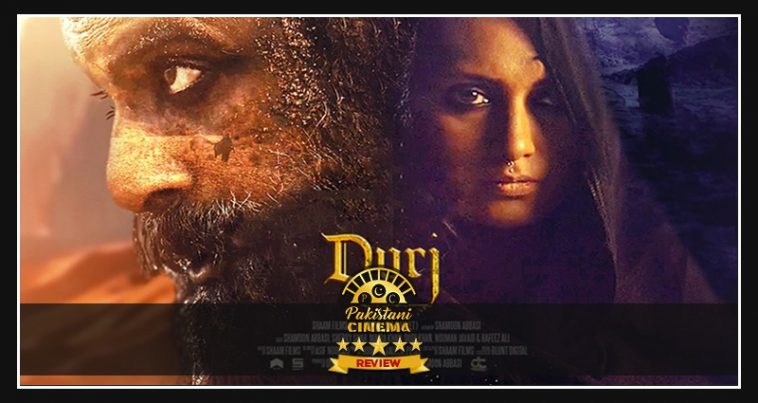When I found out for the first time that Shamoon Abbasi was making a film on cannibalism in Pakistan I was very interested in what he could accomplish. This is a subject not often touched not only in Pakistani cinema but Cinema worldwide. Films like “Raw” and “Martyrs” may have shocked audiences with their violence and gore, but I knew of no film that had explored the psyche of a cannibal. “Durj” does just that. However, I do wish it had gone a little deeper.
“Durj” has all the trappings of a psychological thriller but it’s not the kind of offering you would find anywhere else. It focuses on dialogue and storytelling to descend into the dark recesses of a cannibal’s mind.
Shamoon Abbasi is terrific as the cannibal Gul Baqsh. From the beginning, he is utterly convincing as a man who has seen it all. He cares not for society, nor for acceptance or normalcy. All that drives him is hunger. Along for the ride is Sherry Shah, his companion in sin and in love. Her character, Laali, is equally invested in the sin of cannibalism and eating corpses by the time the film reaches its zenith. Shamoon and Sherry are a match made in hell. It’s because of their convictions to the characters that Durj pulls off their romance most convincingly. I must admit, in a film about cannibalism, the one thing I never expected to feel was sympathy and sorrow for the couple engaging in the act itself. Sherry Shah and Shamoon Abbasi almost make you weep in a pivotal scene where their love and the craving for human flesh are at odds with each other.
Giving their story weight are the visuals of the story. Filmed in the desert among the barren mountains of Sindh, the film’s story is rendered all the more believable because of its setting. Of course, no one would notice if such monsters would be hiding in these caves. Durj shines brightest when it focuses on its two leads and the barren desert. That’s where the meat of the story is, pun fully intended. However, what the film misses out on are the finer details that would’ve elevated it to greatness.
The film is inspired by true events pertaining to two brothers that were found guilty of grave robbing and cannibalizing corpses in 2014. While the film highlights the justice system’s incapability of dealing with such anomalies in human nature, it barely goes further. Yes, there are no laws on the books for such crimes, but what beyond that? Maira Khan’s character Farah, a psychologist who acts as the audience when Gul Baqsh is narrating his story, is hollow. Not only is she unconvincing in the role (acting shouldn’t just be restricted to shrill screams and dialogue uttered through clenched teeth), but it doesn’t matter at all that she’s a psychiatrist. During the entire film she just regurgitates the same moral questions that any normal person would ask themselves upon encountering a cannibal. “Does this person not fear God?”, “Isn’t he ashamed of his crime?”, “How could someone do such a thing?”, etc, etc. There is no deeper examination of Gul Baqsh when Farah is speaking to him. The film does point out that Farah has never treated criminal patients before, but then why make her a psychologist at all? It’s a plot element that goes nowhere.
Other characters in the film are also just that, others. They don’t play significant enough roles to be mentioned or remembered again. Thankfully, Durj stays with Gul Baqsh and Laali for the majority of its runtime.
As for technical flaws with the film, I felt there were a little too many close-up shots, and an abundance of shaky-cam in the more action-oriented scenes. At times these overly-stylistic shots distracted from the story itself. The sound mixing at times was also lacking, as with many other Pakistani films. However, these were minor inconveniences. A better budget and better equipment could’ve solved all of these problems.
Durj by virtue of the subject matter itself is a cinematic achievement and I can see it becoming a cult favorite among cinephiles. Hopefully, this kind of content can be more openly explored in Pakistan in the future. Film is one way that discussions over taboo subjects can at least begin. “Durj” has at least opened the proverbial door.
Durj Movie Review
-
Verdict
Summary
Durj by virtue of the subject matter itself is a cinematic achievement and I can see it becoming a cult favourite among cinephiles. Hopefully this kind of content can be more openly explored in Pakistan in the future. Film is one way that discussions over taboo subjects can at least begin. “Durj” has at least opened the proverbial door.



Pingback:Box Office Update: Local Box Office Numbers Bode ill for the Cinema Business - PakistaniCinema.net